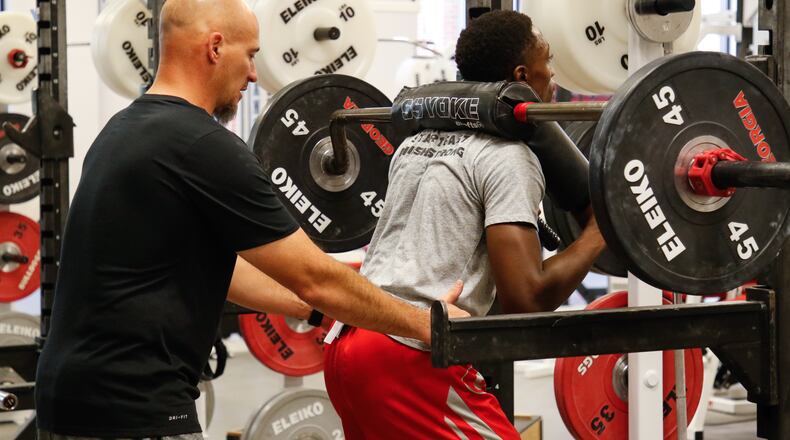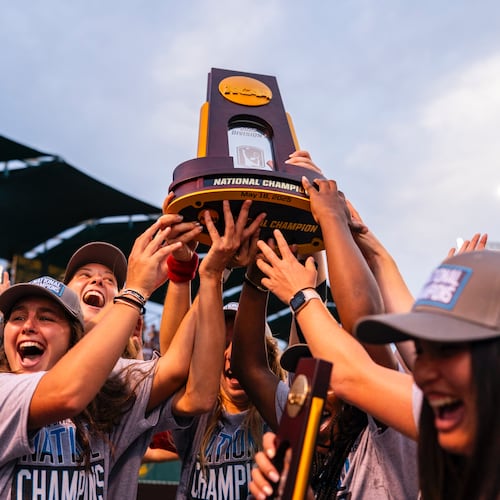To say life has been different for Sean Hayes is an understatement.
The man in charge of training and conditioning Georgia’s men’s basketball players hasn’t seen them in person in months. Yet he stays in touch virtually every day and expects them to be doing what they say they’re doing.
“It’s all voluntary,” Hayes said Monday. “Scouts honor, basically.”
Credit: John Kelley Jr.
Credit: John Kelley Jr.
Neither Hayes nor the Bulldogs know when they’ll be permitted back on campus. Men’s and women’s basketball, like football, were approved by the NCAA Council to return June 8. But neither Georgia nor any of the schools in the SEC have allowed athletes from any sport other than football back into their facilities.
That’s the result of both caution and logistics, according to UGA Athletic Director Greg McGarity. All Georgia's athletic resources are being directed toward keeping the 100-plus football players safe from exposure to the coronavirus.
In the meantime, Georgia basketball players normally would have been on campus for at least three weeks now for voluntary summer workouts. Most of them probably never would have left Athens, if not for the pandemic that forced the close of campuses nationwide in mid-March.
But all Georgia athletes have been asked to continue to prepare for their respective seasons. UGA currently plans to resume face-to-face instruction for fall semester, which begins in August. If that happens, then the basketball season will resume as scheduled.
The Bulldogs’ season ended abruptly on March 12 in the second round of the SEC Tournament in Nashville. They were 16-16 at the time.
Since then, Hayes said he has conducted regularly-scheduled, digital conference calls with the players, at which time they go over what they should be doing and what they’ve done.
“I can’t wait to see how guys are doing, see how they’ve progressed from home,” Hayes said Monday in a Zoom call with reporters. “They’ve done a great job from home. There’s no doubt they’ve been working hard.”
Hayes said both he and the players have had to get creative. Not all of them have access to gyms or weights, so they’ve had to come up with alternative workout plans.
Hayes said it’s not uncommon for him to receive a text from one of the 15 players saying, “Text me a workout” or “I’m at a hill; what can I do?”
“It was all about imagination; it was all about what do we have at home to use?” Hayes said. “We filled up water jugs with sand and water; we used laundry detergent. Some guys bought weighted vests, other guys packed backpacks full of rocks and books. We just made up workouts every day, and that was a challenge.”
Hayes said he conferred with Georgia football’s strength-and-conditioning coordinator Scott Sinclair and borrowed from him what might work well for basketball players. And Hayes said he always made a point to do the workouts himself and share them with his charges.
“I filmed about 35 to 40 videos,” Hayes said. “I wanted to show the guys I was doing to workouts, too. If I’m doing these workouts at 45, hey, you guys can do it, too! I’d text them pictures all the time and say, ‘I better not be in better shape than you when you get back!’”
It made a difference.
“Coach has done a great job of keeping us occupied,” sophomore point guard Shavir Wheeler said of Hayes. “He’d send us workout videos and say, ‘Hey, guys, today let’s rock! Hey, today let’s do some conditioning.’ Coach Hayes is super hands-on, super active. He does the workouts himself. … He’s been a big help.”
Wheeler said he came to UGA at 178 pounds and that he’s up to “about 187.”
“I feel good, I feel fast, I feel strong,” Wheeler said. “And I credit that to coach Hayes.”
Nevertheless, Hayes said there’s no substitute to face-to-face training and instruction, and he’s eager to be able to do that. It’s likely that the basketball players will be able to return sometime in July.
Whenever that time comes, Hayes said the Bulldogs will follow strength-and-conditioning task-force guidelines, which is to bring back the players in tapered waves and easing them into workouts. He’ll utilize a process known as “fusionetics” to determine individuals’ levels of strength and conditioning.
All that is, of course, after they clear COVID-19 testing and medical screens and complete physicals.
“I’ve never coached in a mask before,” Hayes cracked. “… It’s a different challenge; it’s a different day; it’s different stresses that they’ve been going through, something we’ve never experienced as a whole. We’ll do some measurements and testing and find out where our guys are at.”
About the Author
Keep Reading
The Latest
Featured




